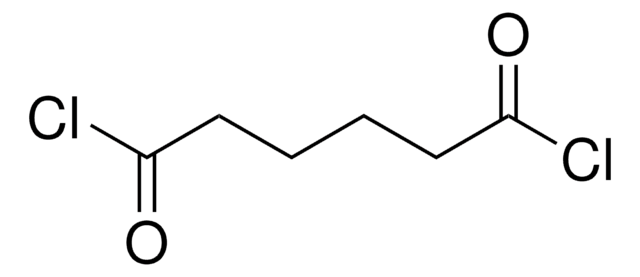01-1730
Adipoyl chloride
SAJ first grade, ≥98.0 %
Synonym(s):
Adipyl chloride
About This Item
Recommended Products
grade
SAJ first grade
availability
available only in Japan
refractive index
n20/D 1.471 (lit.)
capacity
≥98.0 %
bp
105-107 °C/2 mmHg (lit.)
density
1.259 g/mL at 25 °C (lit.)
SMILES string
ClC(=O)CCCCC(Cl)=O
InChI
1S/C6H8Cl2O2/c7-5(9)3-1-2-4-6(8)10/h1-4H2
InChI key
PWAXUOGZOSVGBO-UHFFFAOYSA-N
Looking for similar products? Visit Product Comparison Guide
Signal Word
Danger
Hazard Statements
Precautionary Statements
Hazard Classifications
Skin Corr. 1B
Storage Class Code
8A - Combustible corrosive hazardous materials
WGK
WGK 3
Flash Point(F)
233.6 °F - closed cup
Flash Point(C)
112 °C - closed cup
Personal Protective Equipment
Regulatory Listings
Regulatory Listings are mainly provided for chemical products. Only limited information can be provided here for non-chemical products. No entry means none of the components are listed. It is the user’s obligation to ensure the safe and legal use of the product.
FSL
Group 4: Flammable liquids
Type 3 petroleums
Hazardous rank III
Water insoluble liquid
JAN Code
01-1730-2-25G-J:
Certificates of Analysis (COA)
Search for Certificates of Analysis (COA) by entering the products Lot/Batch Number. Lot and Batch Numbers can be found on a product’s label following the words ‘Lot’ or ‘Batch’.
Already Own This Product?
Find documentation for the products that you have recently purchased in the Document Library.
Our team of scientists has experience in all areas of research including Life Science, Material Science, Chemical Synthesis, Chromatography, Analytical and many others.
Contact Technical Service








